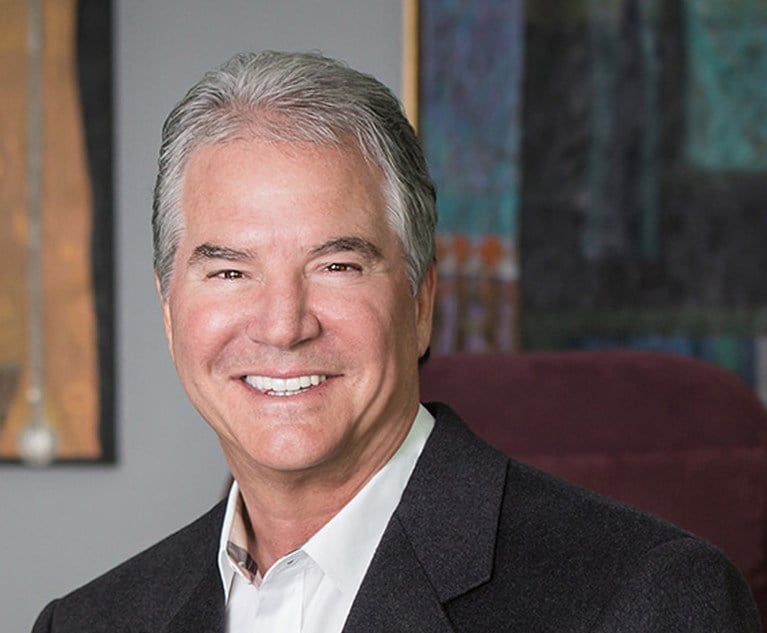Court Finds Flaws With 'Overlapping and Conflicting' Role of Title IX Investigator at USC
California's Second District Court of Appeal found that the school's Title IX investigator held the "roles of investigator, prosecutor, factfinder, and sentencer" in a case where a student was accused of sexual misconduct.
January 04, 2019 at 06:31 PM
4 minute read
 University of Southern California.
University of Southern California.
A California appellate court has set aside the expulsion of a former football player at the University of Southern California finding that a Title IX investigator had ”overlapping and conflicting” roles when looking into allegations that the player had raped a student trainer.
In an opinion published Friday, the Second District Court of Appeal found that, given the potential consequences of USC's disciplinary proceedings, the football player, referred to in the proceedings simply as John Doe, had the right to cross-examine his accuser, Jane Roe, either directly or indirectly. USC's procedures, the court held, left the school's Title IX investigator to act as “investigator, prosecutor, factfinder and sentencer” in such cases and therefore deprived Doe of his right to cross-examine his accuser.
“When credibility of witnesses is essential to a finding of sexual misconduct, the stakes at issue in the adjudication are high, the interests are significant, and the accused's opportunity to confront adverse witnesses in the face of competing narratives is key,” wrote Justice Thomas L. Willhite Jr. “Under such circumstances, the performance of this key function is simply too important to entrust to the Title IX investigator in USC's procedure.”
The Second District's decision is at least the third from the court in the past few years overturning the school's decisions in cases involving allegations of sexual assault. The Second District in 2016 held that a football player involved in a separate incident wasn't given sufficient notice of allegations against him or a fair hearing before being suspended. And in a decision just last month, the court granted a new hearing to another accused student finding that the lead investigator, Dr. Kegan Allee, didn't interview key witnesses or review physical evidence.
Allee was also the investigator in the John Doe case decided Friday. The court rejected Doe's argument that Allee was biased against those like him who were accused of sexual assault due to her work as an advocate for victims prior to taking on her role at USC. The court, however, did find fundamental flaws in USC's procedures at the time of Doe's case, where the appellate panel reviewing a disciplinary decision accepted a Title IX investigator's findings of fact as true. The procedure, the court found, forced the accused to cross-examine the accuser by giving questions to the Title IX investigator during the course of the investigation.
“The notion that a single individual, acting in these overlapping and conflicting capacities, is capable of effectively implementing an accused student's right of cross–examination by posing prepared questions to witnesses in the course of the investigation ignores the fundamental nature of cross–examination: adversarial questioning at an in–person hearing at which a neutral fact finder can observe and assess the witness' credibility,” Willhite wrote. “At bottom, assessing what is necessary to conduct meaningful cross–examination depends on a common sense evaluation of the procedure at issue in the context of the decision to be made. From that prospective, a right of 'cross–examination' implemented by a single individual acting as investigator, prosecutor, factfinder and sentencer, is incompatible with adversarial questioning designed to uncover the truth.”
Doe's lawyers, Jenna Parker and Mark Hathaway of Hathaway Parker, didn't immediately respond to a request for comment.
USC's lawyer, Julie Young of Young & Zinn, directed a request for comment to the school's press office.
A representative of the school said that USC's investigation of the matter was in compliance with all state and federal laws applicable at the time. When the case was decided at the trial court, the school's representative said, no case had required a private university to conduct a live hearing or allow cross examination of witnesses
“The courts are making substantive changes to the requirements for Title IX investigations,” the school representative said. “USC will keep abreast of these evolving judicial interpretations and requirements, and most importantly, remains committed to preventing all forms of misconduct on our campuses, to providing outstanding care to all students, and to ensuring we have policies and procedures that prioritize respect for our students and our entire university community.”
This content has been archived. It is available through our partners, LexisNexis® and Bloomberg Law.
To view this content, please continue to their sites.
Not a Lexis Subscriber?
Subscribe Now
Not a Bloomberg Law Subscriber?
Subscribe Now
NOT FOR REPRINT
© 2025 ALM Global, LLC, All Rights Reserved. Request academic re-use from www.copyright.com. All other uses, submit a request to [email protected]. For more information visit Asset & Logo Licensing.
You Might Like
View All
Assessing the Second Trump Presidency’s Impact on College Sports


LSAT Administrator Sues to Block AI Tutor From Using ‘Famous, Distinctive’ Test Prep Materials
3 minute readTrending Stories
- 1Antitrust Partner Plans Move to Davis Polk From Fried Frank
- 2How This Dark Horse Firm Became a Major Player in China
- 3Bar Commission Drops Case Against Paxton—But He Wants More
- 4Pardons and Acceptance: Take It or Leave It?
- 5Gibbons Reps Asylum Seekers in $6M Suit Over 2018 ‘Inhumane’ Immigration Policy
Who Got The Work
J. Brugh Lower of Gibbons has entered an appearance for industrial equipment supplier Devco Corporation in a pending trademark infringement lawsuit. The suit, accusing the defendant of selling knock-off Graco products, was filed Dec. 18 in New Jersey District Court by Rivkin Radler on behalf of Graco Inc. and Graco Minnesota. The case, assigned to U.S. District Judge Zahid N. Quraishi, is 3:24-cv-11294, Graco Inc. et al v. Devco Corporation.
Who Got The Work
Rebecca Maller-Stein and Kent A. Yalowitz of Arnold & Porter Kaye Scholer have entered their appearances for Hanaco Venture Capital and its executives, Lior Prosor and David Frankel, in a pending securities lawsuit. The action, filed on Dec. 24 in New York Southern District Court by Zell, Aron & Co. on behalf of Goldeneye Advisors, accuses the defendants of negligently and fraudulently managing the plaintiff's $1 million investment. The case, assigned to U.S. District Judge Vernon S. Broderick, is 1:24-cv-09918, Goldeneye Advisors, LLC v. Hanaco Venture Capital, Ltd. et al.
Who Got The Work
Attorneys from A&O Shearman has stepped in as defense counsel for Toronto-Dominion Bank and other defendants in a pending securities class action. The suit, filed Dec. 11 in New York Southern District Court by Bleichmar Fonti & Auld, accuses the defendants of concealing the bank's 'pervasive' deficiencies in regards to its compliance with the Bank Secrecy Act and the quality of its anti-money laundering controls. The case, assigned to U.S. District Judge Arun Subramanian, is 1:24-cv-09445, Gonzalez v. The Toronto-Dominion Bank et al.
Who Got The Work
Crown Castle International, a Pennsylvania company providing shared communications infrastructure, has turned to Luke D. Wolf of Gordon Rees Scully Mansukhani to fend off a pending breach-of-contract lawsuit. The court action, filed Nov. 25 in Michigan Eastern District Court by Hooper Hathaway PC on behalf of The Town Residences LLC, accuses Crown Castle of failing to transfer approximately $30,000 in utility payments from T-Mobile in breach of a roof-top lease and assignment agreement. The case, assigned to U.S. District Judge Susan K. Declercq, is 2:24-cv-13131, The Town Residences LLC v. T-Mobile US, Inc. et al.
Who Got The Work
Wilfred P. Coronato and Daniel M. Schwartz of McCarter & English have stepped in as defense counsel to Electrolux Home Products Inc. in a pending product liability lawsuit. The court action, filed Nov. 26 in New York Eastern District Court by Poulos Lopiccolo PC and Nagel Rice LLP on behalf of David Stern, alleges that the defendant's refrigerators’ drawers and shelving repeatedly break and fall apart within months after purchase. The case, assigned to U.S. District Judge Joan M. Azrack, is 2:24-cv-08204, Stern v. Electrolux Home Products, Inc.
Featured Firms
Law Offices of Gary Martin Hays & Associates, P.C.
(470) 294-1674
Law Offices of Mark E. Salomone
(857) 444-6468
Smith & Hassler
(713) 739-1250







